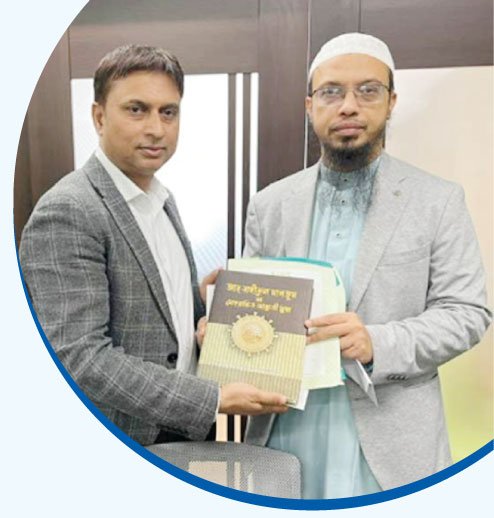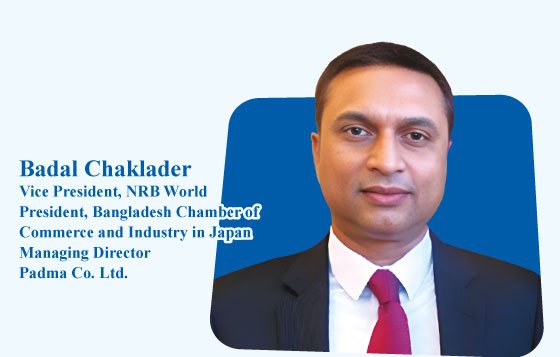Badal Chaklader, a prominent figure in both Japan’s business community and Bangladesh’s global trade network, has proven that talent, initiative, and perseverance can create extraordinary success across borders. As the Vice President of NRB World, the President of the Bangladesh Chamber of Commerce and Industry in Japan (BCCIJ), and the Managing Director of Padma Co. Ltd, Mr. Chaklader has made a significant mark in the business world, bridging economic opportunities between Bangladesh and Japan.
Born in the village of Shasongaon under the Sirajdikhan Upazila in Munshiganj District, Bangladesh, Badal’s journey to success started with humble beginnings. Raised by his father, the late Haji Md Ramizuddin Chaklader, and mother Mrs Banu Chaklader, he developed an early ambition to seek out opportunities abroad. In 1987, he moved to Japan, where his determination to build a successful future led him to pursue both part-time work and language studies. With a clear vision and self-confidence, Mr. Chaklader’s entrepreneurial spirit soon took flight.
The foundation of his success was laid when he opened Padma Restaurant, a venture named after the Padma River, which flowed near his childhood home. The restaurant not only represented his roots but also became a symbol of Bangladesh in Japan. The restaurant’s early success spurred Mr. Chaklader to expand his business ambitions further. In 1989, he founded Padma Co. Ltd, marking the beginning of a thriving enterprise in Japan. The company initially imported food products from Bangladesh and Myanmar, catering to a growing demand for Halal food. As the Halal food market expanded, Padma Co. Ltd’s operations grew, and by 2024, the company imported a variety of food products from Bangladesh, including items from renowned companies like Square Food & Beverage Ltd, Kazi Food Industries, and Pran Dairy Ltd.

Mr. Chaklader’s commitment to Bangladesh never wavered. In addition to his success in Japan, he is deeply involved in the business landscape of his home country. His real estate ventures in Bangladesh, under the name BRS Company, showcase his dedication to fostering economic growth back home. His ambitions for the future include further expanding his business, with plans to introduce more Bangladeshi food products to the global market.
On a personal level, Mr. Chaklader’s life is just as inspiring. He married Kazumi Chaklader, a well-respected member of the Muslim community in Japan known for her social work and support of various charitable initiatives. Together, they have three sons: Amit, Hayat, and Atara. Amit and Hayat have pursued advanced degrees and work in Japan’s renowned shipping industry, while Atara is still a university student. The family is deeply proud of their Bangladeshi roots and their connection to the country’s history, particularly the War of Liberation.
Mr. Chaklader’s contributions extend beyond business. He is actively involved in the Munshiganj-Bikrampur Society in Japan, where he has supported initiatives to aid mosques, schools, madrasas, and orphanages in Bangladesh. His charitable work is especially notable in times of crisis, as seen during the devastating 2011 Tsunami in Japan, when he led voluntary relief efforts to assist affected communities. His social commitment also includes efforts to develop primary schools in his native village, highlighting his belief in the power of education to transform lives.
Through his leadership roles and business ventures, Mr. Chaklader is helping to pave the way for stronger ties between Bangladesh and Japan. As the President of the Bangladesh Chamber of Commerce and Industry in Japan, he plays a crucial role in facilitating trade and investment opportunities between the two countries. His recent efforts to invest in Bangladesh in collaboration with Japan’s External Trade Organization (JETRO) further underscore his vision for mutual economic growth.

Mr. Chaklader’s journey from a young man seeking opportunities abroad to a successful businessman, philanthropist, and visionary leader is a testament to the power of determination, cultural pride, and a deep sense of responsibility to both his homeland and his adopted country. As he looks toward the future, he continues to dream of further strengthening the ties between Bangladesh and Japan, creating more avenues for business, investment, and cultural exchange.
Badal Chaklader’s story is not just one of personal success but a shining example of how a commitment to one’s roots and the pursuit of global opportunities can create lasting impact across generations.



